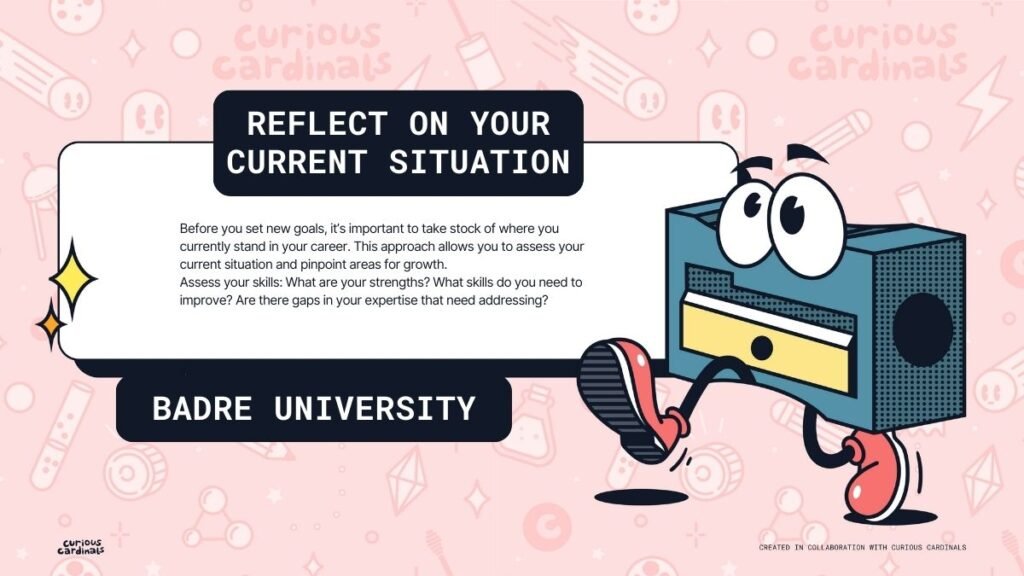Setting and achieving career goals is one of the most powerful ways to drive success. Whether you’re just starting your career or looking to advance in your current job, clear and actionable goals are essential for growth. But how do you set career goals that are achievable but also meaningful and motivating? In this blog post, we will explore career goal setting, its importance, and the step-by-step process for creating goals that will help you thrive in your professional life.
What is Career Goal Setting?
Career goal setting is the process of identifying your professional ambitions and then creating a structured plan to achieve them. These goals can range from short-term targets, like improving specific skills, to long-term goals, such as advancing to a higher position in your field. Career goal setting is an ongoing process, where you regularly evaluate and adjust your goals to ensure they align with your evolving aspirations.

Career goals can be categorized into:
Short-term goals: These are targets you plan to accomplish within a year or sooner. Examples include learning new software, building a stronger network, or completing a project.
Long-term goals: These are broader and more ambitious goals that can take several years to achieve. They could include becoming a leader in your industry, changing careers, or reaching an executive position.
The process of career goal setting can help you stay focused, motivated, and aligned with your desired career trajectory.
Why is Career Goal Setting Important?
Defining clear career objectives is vital for multiple reasons:
Clarity and Focus: Goals help you define what you want to achieve, which gives you clarity about the direction you need to take in your career. Without goals, it can be easy to get sidetracked or feel lost in your professional journey.
Motivation and Inspiration: Establishing goals ignites a sense of purpose. When you know what you’re working toward, it’s easier to stay motivated, even through tough times. Having milestones to hit provides a sense of accomplishment along the way.
Career Advancement: Setting and working toward career goals ensures that you are continuously progressing. Whether it’s acquiring new skills, gaining experience, or building your network, achieving small goals along the way positions you for bigger opportunities.
Sense of Achievement: Reaching your career goals can be a huge source of personal satisfaction. It gives you a sense of accomplishment and reinforces the belief that you can set your mind to something and achieve it.
Improved Decision-Making: When you have clear career goals, making decisions becomes easier. Whether it’s choosing a new job, moving to a new city, or learning a new skill, your goals act as a framework to guide your decisions.
How to Set and Achieve Career Goals?
Now that we understand the importance of career goal setting, let’s dive into the how-to of setting and achieving your career goals. Follow these steps to create a clear path toward success.
Step 1: Reflect on Your Current Situation
Before you set new goals, it’s important to take stock of where you currently stand in your career. This approach allows you to assess your current situation and pinpoint areas for growth.
Assess your skills: What are your strengths? What skills do you need to improve? Are there gaps in your expertise that need addressing?
Review your career achievements: What have you already accomplished? What has been successful in your career so far? This reflection will help you understand where you’re excelling and where there might be room for improvement.
Discover your passions: What activities or roles bring you joy and fulfillment? Understanding what excites you about your career can help you set goals that align with your passions, making it easier to stay motivated.
By reflecting on these aspects, you’ll gain valuable insights into your current position and what you need to focus on for the future.

Step 2: Define Your Long-Term Career Vision
Long-term career goals serve as the foundation for the rest of your professional aspirations. Begin by visualizing your ideal career in the next five, ten, or even twenty years. Ask yourself:
What role do you want to be in?
What industry or field are you passionate about?
What level of income or status do you want to achieve?
These long-term goals give you a sense of direction, helping you stay focused and motivated as you work toward them. Once you have this vision, break it down into smaller, manageable short-term goals.
Step 3: Break Down Your Goals into Short-Term, Actionable Steps
Once you have a clear long-term vision, it’s time to break that down into smaller, short-term goals. These are the steps you need to take in the next year or two to move closer to your long-term objectives.
Here’s how to make short-term goals actionable:
Craft SMART Goals: Ensure your goals are Specific, Measurable, Achievable, Relevant, and Time-bound. For instance, rather than stating, I want to enhance my skills, define it as I will get a project management certification within six months.
Prioritize: Not all goals are created equal. Some goals will help you progress faster, while others might be less urgent. Prioritize your goals based on their importance and relevance to your long-term career vision.
Create an Action Plan: Break down each short-term goal into smaller tasks or milestones. These should be concrete actions that are easy to track. For example, if your goal is to network more, plan to attend two professional events every month or reach out to five new contacts each week.
Step 4: Develop the Right Skills
As you set your career goals, you may realize that there are specific skills you need to develop to achieve them. This could include:
Technical skills: These are industry-specific abilities like programming, data analysis, or digital marketing.
Soft skills: These are interpersonal skills like communication, leadership, and teamwork, which are essential for career growth.
Certifications or education: Sometimes, achieving career goals requires formal qualifications or certifications, such as an MBA or a project management certification.
Identify the skills that are essential for your goals and make a plan to develop them through courses, workshops, or self-study.
Step 5: Stay Accountable and Track Progress
Tracking progress is crucial to achieving career goals. Without a clear way to measure success, it can be easy to lose sight of your objectives.
Set regular check-ins: Periodically assess your progress. Are you progressing toward achieving your short-term objectives? Have you encountered any obstacles? Adjust your plan accordingly to stay aligned with your vision.
Celebrate milestones: Achieving small goals along the way provides motivation and a sense of accomplishment. Celebrate these milestones to stay positive and engaged in the process.
Seek support: Share your goals with a mentor, friend, or colleague. They can offer guidance and hold you accountable for meeting your targets.
Key Takeaways
Reflect on Your Current Situation: Understand your strengths, skills, and passions before setting goals.
Create a Long-Term Vision: Define your ideal career position and break it down into smaller, actionable steps.
Set SMART Goals: Use the SMART criteria to ensure your goals are specific, measurable, and achievable.
Develop New Skills: Focus on improving both technical and soft skills that are necessary to achieve your goals.
Stay Accountable and Track Progress: Regularly evaluate your progress and celebrate small achievements along the way.
(FAQs)
- How do I stay motivated while working toward my career goals?
Staying motivated requires creating a plan that is clear and achievable. Break your larger goals into smaller, manageable tasks, and celebrate small wins along the way. Surround yourself with supportive people and remind yourself why you set these goals in the first place.
- What should I do if I don’t meet a goal on time?
It’s important to assess why you didn’t meet the goal. Was the goal too ambitious? Did you encounter obstacles you couldn’t control? Adjust your approach, set a new deadline, and stay focused on the result. Remember, setbacks are normal, and persistence is key to success.
- Should I set career goals every year?
Yes, it’s a good practice to reassess your goals annually. As your career evolves, your priorities may change. Regularly setting new goals helps you stay on track and ensures you are always working toward something meaningful.
- How do I balance personal and career goals?
Balancing personal and career goals can be challenging, but it’s possible. Ensure your career ambitions resonate with your core values. Consider how your work impacts your personal life, and make adjustments to ensure you maintain a healthy work-life balance.
Conclusion
Setting and achieving career goals isn’t just about achieving success; it’s about creating a roadmap for your future. By setting clear, actionable goals and regularly tracking your progress, you’re taking control of your career path. Whether you’re aiming for a promotion, changing careers, or developing new skills, career goal setting is the key to unlocking your full potential. Start today, take action, and watch your career reach new heights!